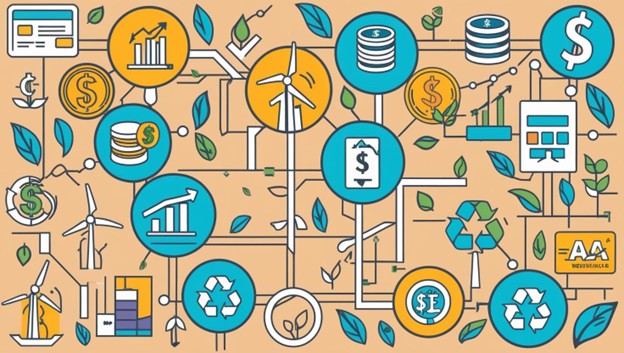Green fintech is emerging as a vital tool in Saudi Arabia’s mission to integrate innovation with sustainability. At its core, green fintech uses technology to offer financial services that actively contribute to environmental goals—such as reducing carbon emissions, supporting green investments, and promoting eco-friendly consumer behaviors. As Saudi Arabia advances toward its Vision 2030 goals, this intersection of finance and sustainability is poised to transform the Kingdom’s financial landscape.
Vision 2030: A Blueprint for Green Transformation
Saudi Arabia’s Vision 2030 has laid a robust foundation for fintech growth, prioritizing sustainability alongside economic diversification. Under the Financial Sector Development Program (FSDP), the Kingdom is committed to enhancing financial inclusion, diversifying income sources, and expanding financing opportunities. These objectives seamlessly align with Saudi Arabia’s strategic climate targets of achieving Net Zero Carbon emissions by 2060 and reducing CO₂ emissions by 278 million tons annually by 2030.
The Kingdom’s fintech ecosystem has grown dramatically—from just 10 companies in 2018 to over 200 fintech enterprises today. Companies like STC Pay, Tabby, and Tamara exemplify this rapid growth. STC Pay, with over 12 million users, demonstrates potential for integrating sustainability features such as carbon tracking. Meanwhile, Tabby and Tamara, leaders in the Buy Now Pay Later (BNPL) space, have the potential to enhance their offerings by integrating sustainability criteria, encouraging consumers toward more eco-conscious purchasing.
Environmental, Social, and Governance (ESG) investing is gaining momentum globally, and Saudi Arabia is poised to capitalize on this trend. Innovators have opportunities to develop platforms offering ESG scoring and investment tools, empowering retail and institutional investors to align their portfolios with their sustainability goals.
With Vision 2030 aiming to significantly boost SME lending, fintech companies like Lendo, which recently secured significant funding from global entities like J.P. Morgan, are ideally placed to close funding gaps. Tailored financing options for renewable energy projects, energy efficiency upgrades, and sustainable supply chains could significantly amplify SME contributions to Saudi Arabia’s sustainability objectives.
Regulatory Backing: A Catalyst for Green FinTech Growth
Saudi Arabia’s regulatory landscape strongly supports sustainability-driven fintech innovation. The Ministry of Finance’s Green Financing Framework encourages investments in climate-related projects. Concurrently, the Saudi Central Bank’s (SAMA) Sustainable Finance Framework outlines clear guidelines for financial institutions to enhance transparency and accountability in green financing. The Fintech Saudi Initiative further positions Saudi Arabia as a regional fintech leader by nurturing innovative solutions. Additionally, SAMA’s regulatory sandbox provides a safe environment to test green fintech solutions before broader adoption.
Despite a global downturn in climate tech investment, Saudi Arabia remains an exception, driven by substantial commitments from the Public Investment Fund (PIF). PIF strategically channels capital into sustainable initiatives, including renewable energy and green hydrogen, firmly establishing Saudi Arabia as a leader in global sustainability efforts. Growing international investor participation further boosts confidence and highlights Saudi Arabia’s potential as a global green fintech hub.

Emerging opportunities in Saudi Arabia’s green fintech market include developing advanced portfolio carbon footprinting tools that help institutions measure, manage, and reduce emissions effectively. Additionally, fintech innovators can create customer-centric carbon footprint tracking applications, providing users with personalized insights and actionable strategies for reducing emissions. Industrial sectors, notably steel and manufacturing, also offer significant opportunities for fintech-driven decarbonization solutions, including sustainable supply chain finance and green industrial technology funding.
While opportunities abound, challenges remain. A primary issue is the lack of standardized ESG data specific to the Saudi market, hindering effective analysis and benchmarking. There’s also a crucial need for specialized technical talent equipped with fintech and sustainability expertise. Increasing consumer awareness and understanding of sustainable financial products will also be essential, alongside an agile regulatory framework that evolves rapidly with global sustainability standards.
The Path Forward: A Sustainable FinTech Revolution
As Saudi Arabia continues its path toward a sustainable future, the synergy between fintech innovation and sustainability presents unprecedented opportunities. For entrepreneurs, investors, and policymakers, green fintech represents more than economic growth—it’s a transformative pathway toward significant environmental impact and lasting prosperity.
At 1957 Ventures, we believe green fintech is foundational to Saudi Arabia’s future economic and environmental landscape. Together, we can drive this exciting revolution, ensuring the Kingdom’s prominence as a global leader in sustainable financial innovation.






